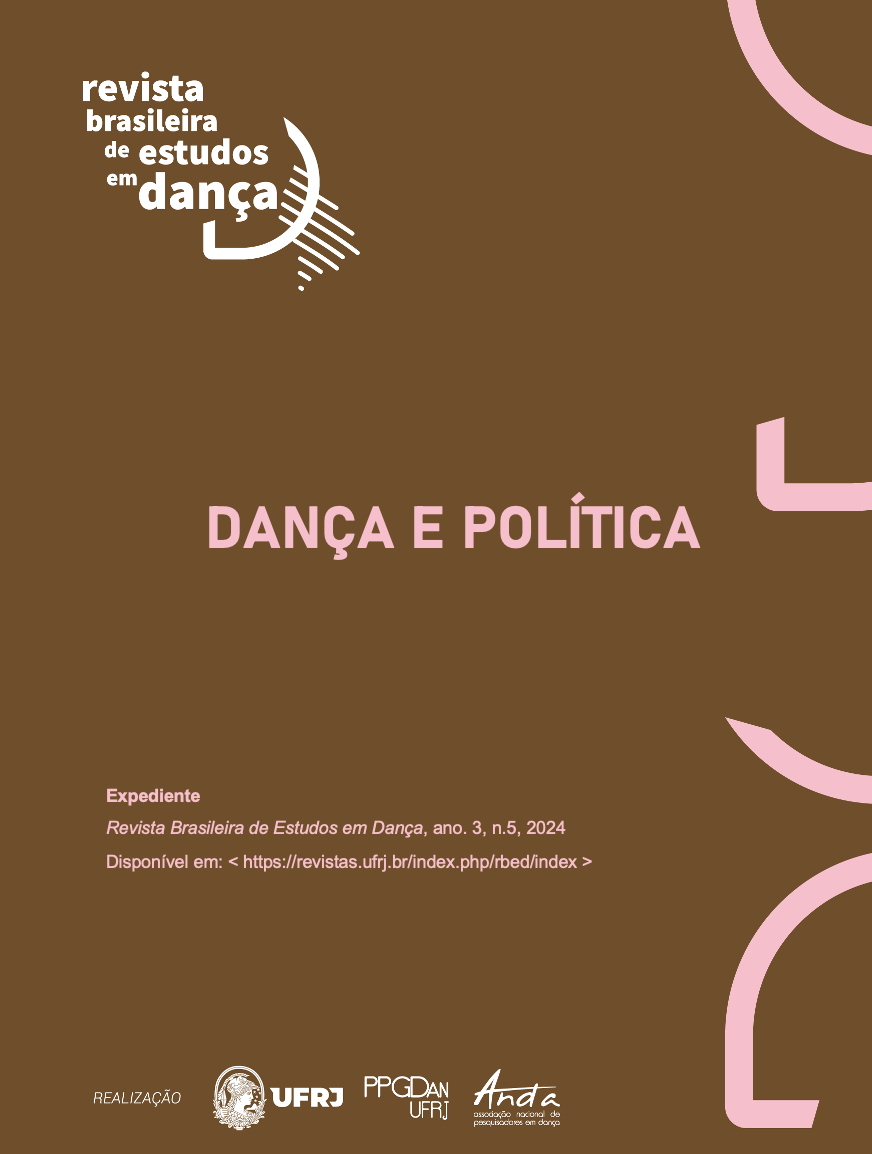isLands: poetics and politics between dances, cities and women
DOI:
https://doi.org/10.58786/rbed.2024.v3.n5.64246Keywords:
Dance in urban spaces, Dance and politics, City, Feminist scenic, Descolonial feminismAbstract
This article is part of the doctoral research, Dances, cities and occupations: poetics and politics of contemporary dance action in urban spaces, in which contemporary dance practices in urban spaces and their relations among city, body, dance and performativity are investigated. In this article, the video performance iLhas (2021) by Marina Guzzo and a collective of women in Baixada Santista (SP) region is brought to analysis, relating it to the reflections generated and driven by the doctorate with the studies of a feminist scenic (Romano, 2023), decolonial feminism (Lugones, 2014) and choreopolitics (Lepecki, 2011).
Downloads
References
ARENDT, Hannah. A condição humana. 11. ed. Rio de Janeiro: Forense Universitária, 2013.
BRITTO, Fabiana D., & JACQUES, Paola B. Cenografias e corpografias urbanas: um diálogo sobre as relações entre corpo e cidade. Cadernos PPG-AU/FAUFBA, v.7(2), 2008. Disponível em: https://periodicos.ufba.br/index.php/ppgau/article/view/2648. Acesso em: 15 de jan 2024.
FERDINAND, Malcon. Uma ecologia decolonial: pensar a partir do mundo caribenho. São Paulo: Ubu Editora, 2022.
GUZZO, M. S. L. Coreografar o comum: aproximações deformativas para territórios. Rev. Gest. Ambient. e Sust. - GeAS, 10, 1-21, e18438, abril de 202.
HARAWAY, Donna. Antropoceno, Capitaloceno, Plantationoceno, Chthuluceno: fazendo parentes. ClimaCom –Vulnerabilidade, Campinas, ano 3, n. 5, 2016.
KOPENAWA, Davi & BRUCE, Albert. A queda do céu - palavras de um xamã Yanomami. São Paulo: Companhia das Letras, 2010.
LEPECKI, André. Coreopolítica e coreopolícia. Revista Ilha. v. 13, n. 1, p. 41-60, Jan/jun 2011. DOI: http://dx.doi.org/10.5007/2175-8034.2011v13n1-2p4. Disponível em:https://periodicos.ufsc.br/index.php/ilha/article/view/2175-8034.2011v13n1-2p41/23932. Acesso em: 20 de set. 2023
LEPECKI, André. Exaurir a dança: Performance e a política do movimento. São Paulo: Annablume, 2017.
LEPECKI, André. Movimento na pausa. São Paulo: N-1 edições, 2020. Disponível em: https://www.n-1edicoes.org/textos/147. Acesso em: ago. de 2021.
LESLIE, Kern. Cidade feminista: a luta pelo espaço em um mundo desenhado por homens. Rio de Janeiro: Oficina Raquel, 2021.
LUGONES, María. Rumo a um feminismo descolonial. Revista Estudos Feministas, Florianópolis, 22(3): 320, p. 935 -952, setembro – dezembro/2014.
MARTINS, Leda. Performances da oralitura: corpo, lugar da memória. Letras, (26), 63–81, 2003.
ROMANO, Lucia. A cênica feminista e o espaço e importância das epistemologias feministas no campo teatral. Texto disponibilizado pela autora no contexto da disciplina ““Diversidade e propostas contra-hegemônicas de interpretação na cena expandida” no Instituto de Artes Unesp - Campus SP, São Paulo, 2023.
SANTOS, Milton. A natureza do espaço: técnica e tempo; razão e emoção. São Paulo: EDUSP, 2014.
SARDENBERG, Cecilia M. B. O pessoal é político: conscientização feminista e empoderamento de mulheres. Inc. Soc., Brasília, DF, v.11, n.2, p. 15-29, jan./jun. 2018.
VILELA, Lilian Freitas. Uma vida em dança: movimentos e percursos de Denise Stutz. São Paulo: Annablume, 2013.
Downloads
Published
How to Cite
Issue
Section
License
Authors who publish in the Revista Brasileira de Estudos em Dança are
responsible for the content of signed articles and retain copyright.
They grant the journal the right of first publication with the work simultaneously
licensed under the Creative Commons Attribution-NonCommercial 4.0 License
(Open Archives Initiative - OAI). This feature, used for open-access journals,
allows sharing work for non-commercial purposes and acknowledges
authorship. If the text is later published in another vehicle, the author
must inform that it was initially published as an article in the Revista Brasileira
de Estudos em Dança. Therefore, even if the journal owns the first publication,
authors are entitled to publish their work in institutional repositories or on
their personal pages, even if the editorial process has not been completed.
The journal reserves the right to make normative, orthographic, and grammatical changes to maintain the language standard, respecting the authorial style.

